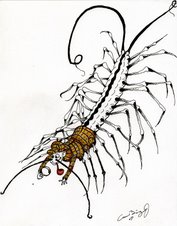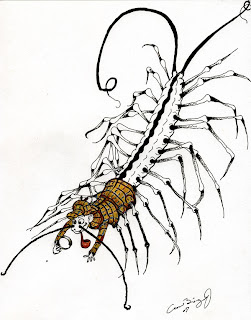 Novels command a certain amount of respect.
Novels command a certain amount of respect.The premise has become the foundation for our television shows, our kids books, and our news cycles; the genre encompasses some of the most well-known writers of the last century, from Ernest Hemingway to Rudyard Kipling (and, if fact, it secretly got Kipling a Nobel Prize). It never has caught on here in the states (and I can almost guarantee it never will now), probably because those who practiced it best were almost always British. And yet, one of my favorite genres in the history of literature is also one of the most ignored today. Of course, I'm talking about serial fiction.
The idea of writing multiple stories about one character (or group of characters) first became famous in the late 1800's, specifically with the publications of A Study in Scarlet (1887) and The Jungle Book (1894). Though there were people who did it before, the wide dissemination and instant popularity of Sherlock Holmes and Mowgli (respectively) left a strong impression. To me, the idea still does.
Similar to a novel, someone who writes bunches of stories can develop and flush out characters while tangling with some overarching themes. Unlike the novel, the authors are not tied to one plot-line, and since the stories are shorter than a typical novel chapter, they can write more in less time, thereby retaining an audience more effectively. There are other advantages, too. Since each story stands alone, they are typically more compelling and less long-winded. Since the authors aren't going through a publishing house, the deadlines are almost non-existent.
So why has serial fiction fallen to the likes of Encyclopedia Brown and The Hardy Boys? Partly, I think, because kid's books are the only things that sell when they are short and skinny. Moreover, publishing companies run this country like a 1960's numbers racket, and ten thousand over-hyped novels are cheaper to manufacture than ten thousand well-constructed copies of a magazine. Some of it, I'm sure, also has to do with literary magazines not even having half the readership of a rural newspaper. The most critical factor, beyond all others I'm positive, is that magazines don't pay for stories anymore, and authors get royalties for novels. The combination of all those things is pretty damning.
Still, I would like to see someone try and bring it back. If J.K. Rowling, on her Harry Potter victory lap, announced that her next project would be an epic released in subsections to a variety of different literary magazines (very similar to how James Joyce published Ulysses, by the way), she could no doubt revolutionize the industry. Besides taking money out of the hands of the large publishing blocs and giving it back to the places that have always pushed the medium forward, she could also encourage multiple generations to read more than one book every two years or so. Serial fiction was more popular than novels when Kipling and Doyle were done, and I think it could happen again if the right person were to give it a kick start. Perhaps I'll write J.K. a strongly-worded letter about it. Perhaps you should too.


1 comment:
Indeed, we should write to Ms. Rowling! Great article. In fact, some of us writers at The Legends of Mernac are hoping to do just that - renew interest in the serial genre through our on-going stories of fantasy fiction. Still in the planning stages right now though. Thanks for the information!
Post a Comment